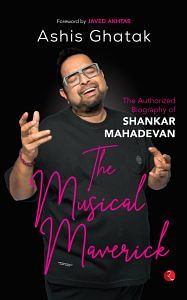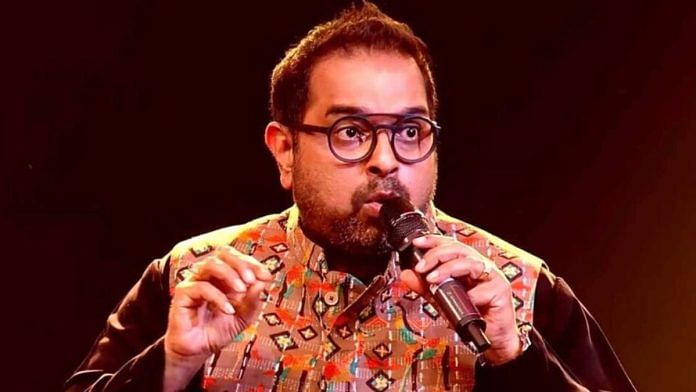Like all his friends, he also joined the beeline to collect forms for engineering institutes and got entry into another new world of academics. He was yet unaware of the powerful whirlwind approaching him—the wind that would change the course of his life forever.
Around that time, Shankar was introduced to another world of music by Ranjini Balamani, T.R. Balamani’s daughter. Once, during his class with T.R. Balamani, Shankar heard a voice singing an alaap in a very unique way. The song was very distinct from the regular ones he had heard. The way of articulating the lines was extremely unique. It was Ghulam Ali’s ghazal that Ranjini was playing on a tiny cassette player in the adjacent room.
When he heard the strains of ‘Chupke Chupke Raat Din’ he was mesmerized—as if under a magical spell. It was part of Shankar’s psyche that whenever he heard something unique that fascinated him, he would start learning that art form. Before he realized it, he got pulled towards this world of ghazals through the magnetic voice of Ghulam Ali. Ranjini was more than happy to play one ghazal after another for Shankar as he tried to fathom the
depth of Ghulam Ali’s singing. Gradually, he introduced Ghulam Ali’s songs to all his friends and soon they also became a part of the ‘Ghulam Ali Fan Club’. Ali helped Shankar discover a world of his own during his time of self-discovery and the turbulent passions of early youth.
Also read: Indian opium paid for Chinese tea. It pushed wealthy Asia into poverty
Shankar was eager to sing everywhere, except when he was told to practise music at home. His mother would lose patience and often declare a ban on him going out unless he sang a varnam or kriti. The wily Shankar would pick the smallest kriti, finish it up fast and before even anyone would realize his beguiling ways, he would rush to meet his friends. In the meantime, kutcheris of Carnatic classical music would also keep happening where Shankar used to participate regularly. By then, Shankar had become a proud owner of a small synthesizer—the MT70, more popularly called by the generic name ‘casio’. Soon this became Shankar’s regular instrument for his performances in the cultural programmes
organized by various saarvajanik Ganeshotsav groups.
During this time, Shankar was the most sought-after musician in all nearby neighbourhood events. This was also where all his diverse musical skills came to the fore. First, he would
sing devotional songs or Marathi bhav geet; second, he would improvise with Carnatic classical music; and finally, he would finish his performance with super hit songs of Kishore Kumar. He was a complete package and so both the audience and the organizers were happy when he performed. Once, a disciple of Shri Shankaracharya had come to Bombay from Sringeri Math.
During the disciple’s travel within Bombay, Shankar was given the charge of accompanying him with his keyboard to play bhajans with the group. However, the most coveted time for Shankar was when he would sing a Ghulam Ali ghazal, with Rajesh accompanying him
on the tabla. These kinds of baithaks at Shankar’s place would have all their friends in full attendance, along with Sangeeta and her friends as well. The Ghulam Ali mania was at its peak. Shankar was so deeply enamoured with these ghazals that in many intercollege ghazal competitions he would invariably be singing them to win the competition.
In many cultural programmes, Rajesh would take over the role that Shankar’s father played earlier by sitting on the stage with a green copy which had all the lyrics written down meticulously. If Shankar would falter during the performance, Rajesh would promptly open the page where the lyrics were written. These musical soirée evenings were held at Shankar’s place where all his friends would join in. Quite often, the mehfils would continue well past midnight. Among the frequent guests were Durga Jasraj (daughter of Pt Jasraj) and a young talented singer by the name of Rattan Mohan Sharma, who later became a classical singer of great repute.
Once, Shankar sang in the presence of the maestro Pt Jasraj. The show was for a foundation initiated by Durga Jasraj. When the performance was over, Shankar very humbly said that he would like to pay a tribute to Pandit ji by singing one of his compositions.
Pandit ji was very happy. After the show, he said that his daughter had brought Shankar to him many years ago requesting Pandit ji to teach him. Pandit ji had refused to teach Shankar because he could teach only those who had dedicated their lives to music
and Shankar’s priority at that time was engineering. However, that day, on the stage, he declared without any hesitation that it was his bad luck that he missed the opportunity to teach him. Pandit ji said that Shankar had grasped knowledge just by hearing his
music, and that he had sung Pandit ji’s composition with such a unique take that it had opened his eyes. Shankar was floored by such a huge compliment.
 This excerpt from Ashis Ghatak’s Authorized Biography of Grammy 2024 Winner for Best Global Music Album, Shankar Mahadevan, The Musical Maverick, has been published with permission from Rupa Publications.
This excerpt from Ashis Ghatak’s Authorized Biography of Grammy 2024 Winner for Best Global Music Album, Shankar Mahadevan, The Musical Maverick, has been published with permission from Rupa Publications.



